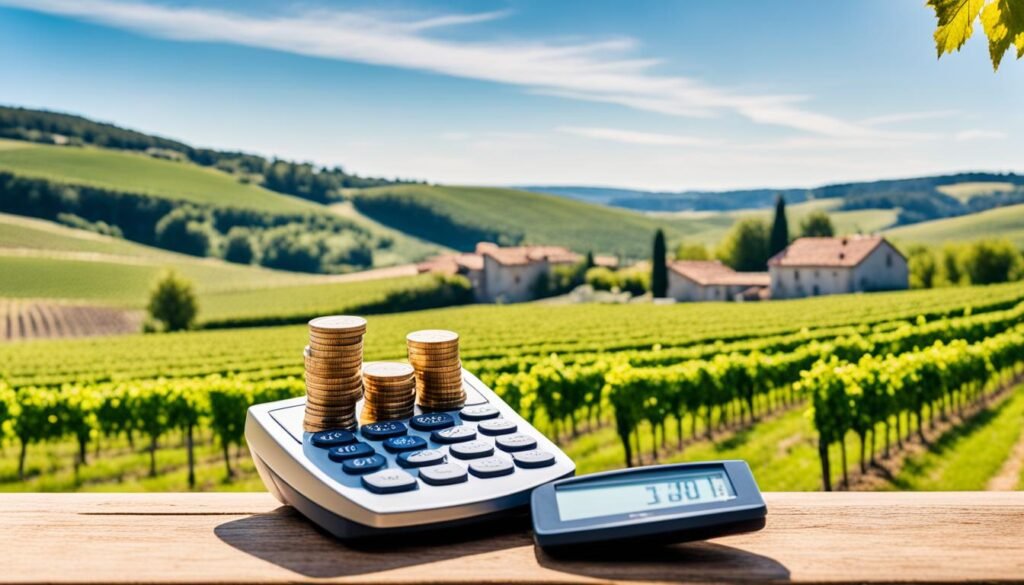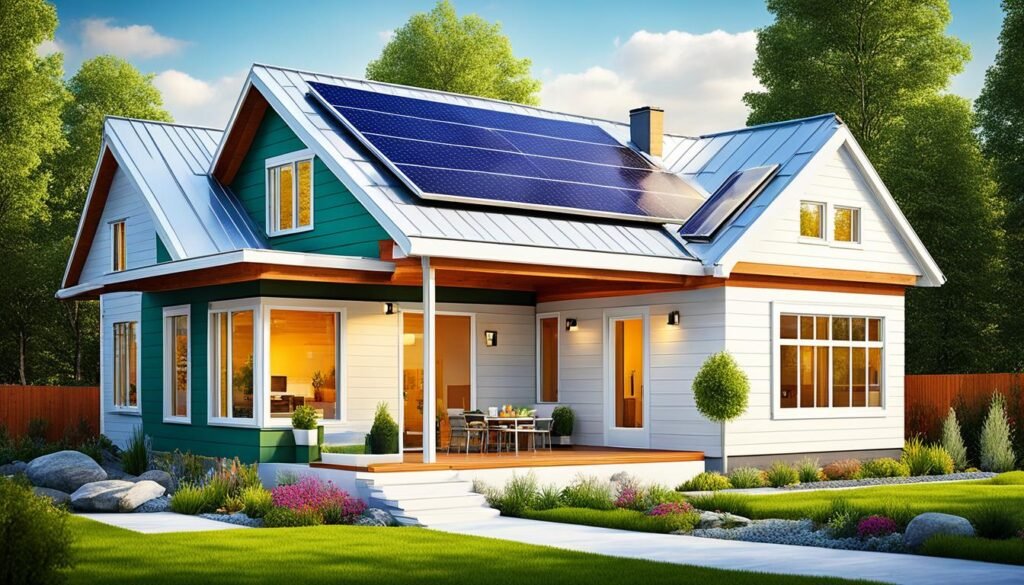Embarking on international property investment in the picturesque locales of France is an opportunity that captivates many. With the dynamism of the French real estate market, understanding the intricacies of financing property in France becomes crucial for potential investors. A significant 31% of French households held a mortgage in 2020, surpassing the EU average1, and with average mortgage rates in France taking a sharp dive to 1.1% in 2021 from about 2.4% in 2014, the allure for financing a dream home here proves ever more compelling1.
Whether you’re a resident or a globetrotter seeking a quaint retreat, diverse property financing options in France like fixed-rate mortgages, which predominantly span 6-25 years, offer sought-after predictability and security1.
Key Takeaways
- Understanding the French property market is essential for successful investment.
- Mortgage rates in France have decreased, offering attractive borrowing conditions.
- Property financing options in France cater to both residents and non-residents with competitive LTV ratios.
- Fixed-rate mortgages offer a stable financing route for international property investment.
- The French real estate market offers diverse investment opportunities with recent trends showing a robust increase in activity.
Introduction to the French Property Market
The allure of French chateaus, vineyards, and city apartments continues to capture the imagination of international investors, solidifying the reputation of the French property market financing structure as a cornerstone for successful real estate investments. With a strong record of one million transactions in 20222, France’s property market demonstrates a remarkable resilience attracting both residents and overseas buyers.
2023 brings new considerations for those looking to engage in real estate financing in France. Experts remain cautiously optimistic, predicting a 3% price increase in the market2, despite challenges such as a 4.5% surge in interest rates since September2. This stability becomes a significant draw for foreign investors seeking a market that can weather economic fluctuations.
The Appeal of French Real Estate
With its historical cities and tranquil countryside, France offers a diverse portfolio for international investors. This year, although sales may face financial challenges2, the overall charm and cultural richness of French real estate remain as enticing as ever. The foreign ownership regulations in France are clear and structured, providing a secure and regulated environment for investments.
Stability of the French Property Market Post-Pandemic
In the aftermath of the pandemic, the French property market stability is a testament to its enduring allure. While commercial real estate in the centers of medium-sized cities experienced a downturn, with an average decline of 17% for offices or logistics and 12% for malls2, the market’s ability to adjust and evolve keeps global interest alive.
Foreign Ownership in France: Regulations and Benefits
France’s legal framework upholds the integrity of the market with comprehensive rules such as non-resident associates’ rental income being taxed at a minimum of 20% or 30% based on the amount2. Moreover, transactions exceeding €15 million need prompt declaration to the Bank of France2, ensuring transparency and fiscal responsibility. With fiscal measures adapting to remote working’s popularity, such as office valuation adjustments2, France is positioning itself as a forward-thinking destination for property investment.
In summary, the French property market financing landscape offers stability and potential growth for discerning investors. The convergence of diverse property selections, reliable market conditions post-pandemic, and clear foreign ownership regulations in France2 continue to make this European destination a favored choice for the global real estate community.
Key Considerations for Financing Property in France
Embarking on the journey of property ownership in France presents unique challenges and opportunities for foreign investors. It is crucial to navigate the intricate web of mortgage rates in France, property financing options, and legislative requisites to ensure a successful investment. To complement this understanding, one must also look into the loan-to-value rates for non-residents in France, a key factor in property acquisition strategies.

Understanding Mortgage Rates and Trends
The financial landscape in France offers a myriad of property investment loans, each with varying mortgage rates that respond to global and national economic indicators. Foreigners aiming to invest in this market should note that French property mortgages are often not readily available for them, prompting a pivot towards alternative financing methods3. Those who can navigate this terrain may find developer financing as an accessible option, which typically involves stage-based payments with minimal formalities3.
Impact of Macroeconomic Factors on Property Investment
Investors must consider how macroeconomic factors influence property financing in France. For example, international events and economic stability can cause fluctuations in mortgage rates and property values, affecting the long-term return on investment. To manage these uncertainties, investor prudence dictates exploring different financing structures, such as property investment loans, that suit their fiscal goals.
Exploring Loan-to-Value (LTV) Rates for Non-Residents
One of the most critical factors in financing for non-residents is assessing the loan-to-value rates in France. Non-residents may experience steeper down payment requirements, sometimes ranging from 30% to 50% of the property’s value3. This higher equity demand underscores the importance of understanding and preparing for the financial implications of investing in French real estate as a foreign entity.
In addition to LTV considerations, potential investors must be prepared for additional transaction costs, which can exceed 10% of the property’s sales price, reflecting fees such as transfer taxes, legal costs, and real estate agent commissions3. Attention to these financial obligations, alongside a comprehensive grasp of local ownership laws and taxation regulations, positions the investor to make well-informed decisions in the French real estate market.
Finally, it’s essential to recognize that property rights and local regulations regarding foreign ownership can vary significantly, with some countries restricting access or offering leasehold arrangements rather than outright ownership3. These variances emphasize the importance of conducting thorough research or consulting with legal experts as part of the property investment-process in France.
As you consider each of these elements, remember that financing property in France as a non-resident is a discernible possibility with the right approach and understanding of the intricate details that shape this unique investment landscape. Forging ahead with insider knowledge of mortgage trends, macroeconomic impact, and LTV ratios could greatly enhance the prospects of successful property financing in France.
Diving Into French Mortgage Options
When considering purchasing property in France, navigating through the array of French mortgage options available can dramatically impact buyers’ financial strategies. From fixed-rate French property mortgages to more complex products like interest-only mortgages, understanding each option’s nuances is key to a successful investment.
Fixed-Rate Mortgages: Stability Over Time
Fixed-rate French property mortgages offer long-term stability as your interest rate remains the same throughout the mortgage term. This consistency can shield borrowers from fluctuations in the market, facilitating better financial planning and budgeting.
Variable-Rate and Capped Rate Mortgages: Understanding the Risks and Rewards
Variable-rate French property mortgages come with a level of uncertainty but also potential savings. Capped rate mortgages blend the two, limiting the interest rate’s upward movement, thereby offering a safeguard against excessive rate hikes.
Interest-Only Mortgages and Other Specialized Loan Types
Interest-only mortgages allow borrowers to pay only the interest on the loan for a certain period, thereby reducing initial payments. These and other specialized loans can cater to unique buyer circumstances and investment strategies.
Eco-Friendly Financing: Green Mortgages in France
Eco-friendly financing in France is gaining traction with mortgages that offer incentives for energy-efficient homes. These green mortgages can lead to lower energy costs and support environmental sustainability commitments.

Amid these options, it’s essential to consider the associated costs with property purchases in France. Notaire fees typically range between 6% and 8% of the purchase price, while mortgage fees for loan registration may add up to 2% of the loan value4. Understanding these fees can help make an informed decision about the appropriate mortgage.
Moreover, partnering with financial service providers like Moneycorp can offer competitive exchange rates and low transfer fees, enhancing the overall affordability when buying property in France4. With the option to lock into an exchange rate for up to two years, Moneycorp can help mitigate currency risk4.
| Loan Type | Pros | Cons |
|---|---|---|
| Fixed-Rate Mortgage | Financial certainty, no interest-rate surprises | Potential higher cost if rates decrease |
| Variable-Rate Mortgage | Possible lower rates, flexibility | Uncertainty in payments |
| Capped Rate Mortgage | Limits on interest rate increases, more control | Potentially higher initial rate than variable |
| Interest-Only Mortgage | Lower initial payments, cash flow benefits | Total mortgage cost can be higher |
Ultimately, the right mortgage choice will depend on individual financial situations, property types, and market conditions. Choosing the correct mortgage option while considering cost structures is essential to maximizing the benefits of owning property in France4.
Financing Property in France
Entering the French real estate market can be an exhilarating opportunity for foreign investors, yet it is accompanied by a necessity for meticulous planning and understanding of the local mortgage landscape. Securing a mortgage as a non-resident involves a series of mandatory steps that are both regulated by French law and dictated by prudent financial practice.
The Process of Securing a Mortgage as a Foreign Buyer
Embarking on the mortgage process for foreign buyers starts with the requirement of a French bank account, set up to facilitate the automatic deductions for mortgage payments. Applicants typically need to provide certified identification and an original utility bill from their country of residence5. Additionally, the timeline for finalizing a property purchase post-acceptance of a French mortgage spans a period of up to four months5, giving the buyer ample time to arrange for the subsequent steps in their investment journey.
Mandatory Capital Insurance Protection for Borrowers
Understanding the necessity of capital insurance protection is paramount. French lending institutions may mandate medical evaluations for mortgages exceeding 230,000 euros—a protocol that could include interviews, blood tests, and even electro-cardiograms to provide life insurance coverage for the loan5. This form of protection ensures that the debt is covered in unforeseeable circumstances, safeguarding both the borrower’s family and the lending entity.

Navigating Additional Fees and Property Transaction Costs
A pivotal aspect of financing property in France is budgeting for the property transaction costs in France. This includes not just the purchase price but also the notary fees and taxes. Buyers must also proactively ensure that insurance is in place on the day of sale, or potentially managed by a management company in the case of leaseback properties—an essential step to avoid any complications during the finalization of the transaction5. Utilization of wire transfers to remit the balance of funds to the notaire before the closure of the sale is a standard requirement5.
Cognizance of the French mortgage offer’s validity—typically 30 days after receipt—and the obligatory 11-day reflection period, as stipulated by consumer protection law, is crucial for a foreign buyer preparing to delve into this market segment5. Such insights not only ensure compliance with local regulations but also equip investors with the foresight to navigate these transactions smoothly.
Step-by-Step Guide to Applying for a French Mortgage
With its stable property values in rural areas and a quality of life marked by excellent welfare, cuisine, and more sunshine, France is an alluring destination for property investors and homebuyers alike6. Laying the groundwork for your venture into the French real estate market involves a strategic financial approach. Let’s unlock the journey to homeownership in France, highlighting the importance of pre-approval for a mortgage, meticulous document preparation for a mortgage, and addressing the essential pre-closing steps for a mortgage.

Pre-Approval: Starting Your Journey Right
Securing pre-approval for a mortgage is the first critical step in applying for a French mortgage. With interest rates evolving in 20237, pre-approval grants you a clearer vision of your financial capacity. It also bolsters your credibility as a buyer, showing sellers you are committed and financially ready to purchase.
Document Preparation: Knowing What You Need
Document preparation is pivotal and can be quite detailed when applying for a French mortgage. Assemble all financial records, income statements, and ensure your UK residency status aligns with the post-Brexit requirements7. A deposit, typically 10% of the purchase price, will demonstrate your earnest intent7.
Accounts and Insurance: Essential Pre-Closing Steps
Opening a French bank account is indispensable for managing payments and potential rental income, which may be taxable up to a certain threshold7. Insurance, too, is a non-negotiable, being a safeguard that fulfills both legal obligations and personal peace of mind. It is imperative that these accounts and insurance plans are sorted well in advance of closing.
| Lifestyle Factor | French Average | Comparison (UK Average) |
|---|---|---|
| Life Expectancy | 82.4 years6 | 81.05 years |
| Michelin-starred Restaurants | 276 | Varies |
| Sunshine | At least 30% more6 | Less |
| Property Sale Process | ~3 months7 | Varies |
Remember, although the buying process in France is generally streamlined, taking around six months to complete6, the key to smooth sailing is understanding and timely execution of these procedures. With patience and thorough preparation, your pursuit of a French mortgage can lead to a successful acquisition of property in this beautiful country.
Conclusion
In summation, financing property in France offers a combination of traditional and innovative mortgage options to suit diverse investment strategies. With the possibility of mortgage durations ranging from 5 to 30 years, investors can opt for longer durations to benefit from lower monthly payments8. The essential financial commitment usually begins with a 20% cash down payment for existing properties, a benchmark that could potentially be tailored to individual circumstances8. Additionally, understanding the legal fees involved—ranging from 3-8% of the purchase price depending on the property’s age and type—is crucial for an accurate budget projection8.
Fixed-rate French property mortgages serve as a sanctuary of predictability, sparing investors from the ebbs and flows of interest rate changes, albeit at typically higher interest rates to begin with8. Alternatively, variable-rate mortgages track a market index after an initial fixed period, a choice that might allure those looking to leverage market conditions8. Here, the option for early repayment often presents without penalty, in contrast to fixed-rate mortgages where penalties may apply8. For examining these mortgage options in depth, selecting the right French mortgage tailored to your situation is imperative.
My final thoughts on financing property in France emphasize a clear-eyed approach to the investment, guided by solid research and grounded expectations. Amortised mortgages offer the reassurance of a decreasing balance over time, while interest-only mortgages might synchronize with an income-driven repayment plan, such as one supported by rental yields8. The array of choices enables investors to align their financial tactics with long-term objectives. By integrating well-informed decisions with financial readiness, your journey toward investing in French real estate can indeed be a rewarding venture.
FAQ
What are the financing options for property in France?
What are mortgage rates like in France?
Are there any special financing options for non-residents investing in French property?
What types of mortgages are available for financing property in France?
What is the process of securing a mortgage as a foreign buyer in France?
Are there any additional fees and transaction costs associated with financing property in France?
What is the step-by-step process of applying for a French mortgage?
Source Links
- https://www.expatica.com/fr/housing/buying/your-guide-to-french-mortgages-102497/
- https://www.lexology.com/library/detail.aspx?g=4ce32636-7a4c-40e7-b4fa-c32e5c2c2885
- https://www.investopedia.com/articles/personal-finance/050815/how-finance-foreign-real-estate.asp
- https://www.moneycorp.com/en-us/news-hub/buying-a-home-in-france-as-an-american-in-2024/
- https://www.francehomefinance.com/for_buyers/more/financing_a_french_property/
- https://www.propertyguides.com/france/buying/
- https://news.iadoverseas.com/france/the-steps-to-buying-your-dream-home-in-france-2756/
- https://www.francehomefinance.com/for_buyers/more/choosing_the_right_french_mortgage/

Comments